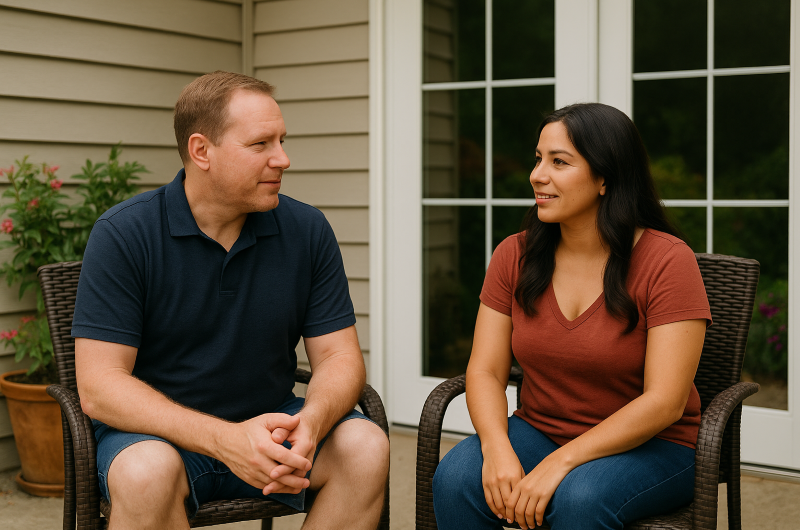
When a one-time favor turns into an expectation, setting boundaries protects your time and energy. Saying no isn’t unkind—it’s an act of self-respect.
By Sergio Toledo
Editor-in-Chief, Heed to Heal
Introduction
There are moments when you do something kind for someone, not out of obligation but because you genuinely want to help. Maybe you stayed late to give them a ride, covered a shift, or agreed to something that took time and effort on your part. You might not have planned to make it a regular thing, but it felt good to do something thoughtful. At first, it’s just a single act of generosity, a way of showing you care. Then something subtle shifts. The next time they need that same thing, they ask again. And then again. What started as kindness slowly turns into an expectation that you’ll always say yes.
It’s not that you regret helping. It’s the feeling of being quietly pulled into something that no longer feels like a choice. The favor has been transformed into a habit in their mind, and now you’re left trying to figure out how to step back without creating tension. This is exactly why setting boundaries is so important. Boundaries are not about closing your heart to others. They are about protecting your time, energy, and sense of self before resentment has the chance to grow.
When Kindness Starts to Turn into Pressure
A single favor can change the dynamic between two people more quickly than many realize. While some will appreciate the gesture and leave it at that, others might start to see it as something they can depend on whenever they need it. They may not be trying to take advantage of you in a deliberate way. Sometimes people slip into a pattern without noticing that what they’re asking of you is more than you can give.
This is how pressure builds quietly. The ask no longer comes with hesitation or awareness; it becomes an assumption. You might feel like you have to say yes because you’ve said yes before. In those moments, it’s no longer a kind choice—it’s a routine that was never meant to exist. Over time, this creates a weight you didn’t agree to carry.
The longer this continues, the more complicated it becomes to change. The other person grows accustomed to your help, and you begin to feel cornered. Recognizing that shift early on allows you to step in and make your boundaries clear before the pressure becomes too heavy.
Why Boundaries Protect More than Just Your Time
For many people, saying no is uncomfortable. It can stir up guilt, self-doubt, or the fear of disappointing someone. But boundaries are not about being selfish. They are about being honest with yourself and with the people around you. When you keep saying yes to something that drains you, resentment builds quietly. And resentment doesn’t just affect you—it seeps into how you feel about the other person.
When you set clear boundaries, you create mutual understanding. You let others know what they can and cannot expect from you. This prevents future misunderstandings and preserves the warmth in your connection. It ensures your kindness remains a choice, not a burden. When people understand your limits, they are less likely to assume that your “yes” is automatic. It also teaches them to respect the fact that your time and energy are valuable.
Healthy boundaries make your relationships sturdier because they keep things balanced. You’re not pouring from an empty cup, and they aren’t unknowingly taking more than you can give. Both sides benefit from the honesty that boundaries bring.
Saying No without Guilt and Choosing Yourself
Learning to say no without guilt takes practice, especially if you’ve spent years being the person who always says yes. Drawing a line where there was once endless flexibility can feel uncomfortable at first, but it’s a discomfort that leads to greater peace. Protecting your capacity doesn’t make you uncaring. It makes your kindness intentional.
A gentle no doesn’t need to be harsh or defensive. Simple statements like “I can’t this time” or “That doesn’t work for me right now” can be both honest and kind. People who value your friendship will respect your boundaries, even if it takes them a moment to adjust. You don’t owe anyone a long explanation or a list of reasons to justify your no.
And when the guilt starts to creep in, remind yourself that choosing yourself doesn’t make you selfish. It means honoring your energy and your limits. If a favor has turned into an expectation, it’s not your responsibility to keep giving just because you did it once. Healthy boundaries protect your well-being, but they also protect the relationship itself by keeping resentment from growing. You are allowed to care deeply, and you are also allowed to stop when something no longer works for you.
References
- Cloud, Henry, and Townsend, John. Boundaries: When to Say Yes, How to Say No to Take Control of Your Life. Zondervan, 1992.
- Baumeister, Roy F. “Ego Depletion and the Self’s Power to Say No.” Journal of Personality and Social Psychology, 2007.
- Brown, Brené. The Gifts of Imperfection. Hazelden Publishing, 2010.
Originally published by Heed to Heal, 10.14.2025, under the terms of a Creative Commons Attribution-NonCommercial-NoDerivatives 4.0 International license.







